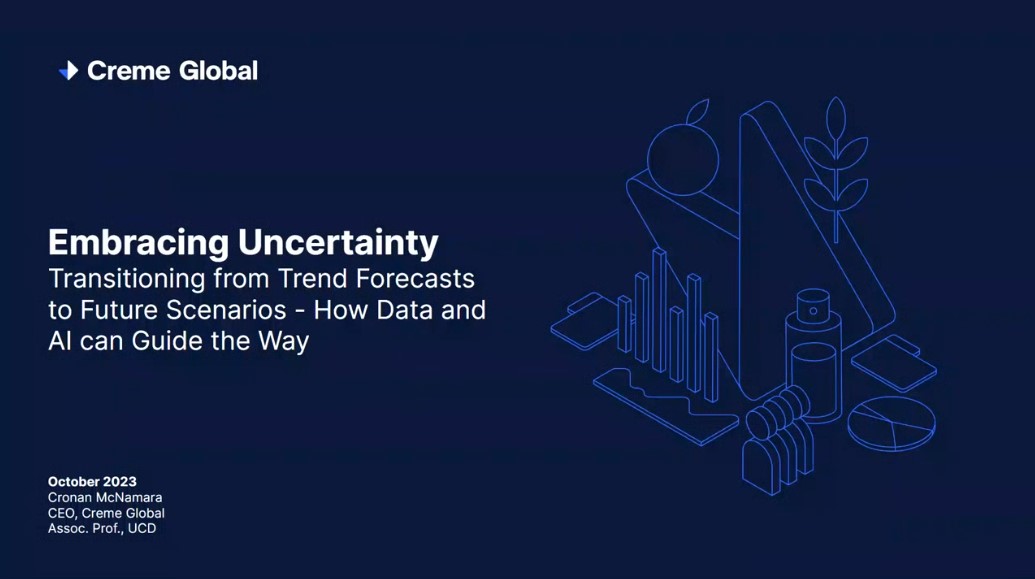The main themes of the IAFP 2024 Annual Meeting revolved around a collective commitment to advancing food safety through innovation, collaboration and shared data, and effective communication.
This year, Brendan Ring (Commercial Director), Cronan McNamara (CEO), and James Doyle (Director Global Accounts) from the Creme team were in attendance. James delivered a session titled ‘Impact of Effective and Timely Communication of Relevant and Complex Scientific Data to Influence Human Behavior‘ which you can read and watch here.
There were ten primary themes highlighted during the conference:
1. Unified Approach to Food Safety
The overarching theme of the conference was “A Unified Approach to Food Safety,” emphasizing the need for collaboration among stakeholders across the food safety spectrum. This included professionals from academia, industry, and regulatory bodies working together to enhance food safety standards globally.

Jim Jones, deputy commissioner for human foods at the FDA, discussed the upcoming reorganization into a unified Human Foods Program, set to be implemented on October 1. He emphasized the importance of transparency and collaboration, stating, “Transparency sounds like it’s motherhood and apple pie until you have a painful moment… My position is we’re going to tell them, ‘This is what we know, and this is what we don’t know’”
2. Innovation and Technology
The conference highlighted the role of emerging technologies in improving food safety. Sessions focused on innovative solutions such as Whole Genome Sequencing (WGS) for pathogen detection, predictive models for risk assessment, and advanced agricultural water treatment methods. The use of artificial intelligence and data-driven approaches to design better food safety strategies was also a key discussion point.
The session on FSMA 204 traceability requirements underscored the importance of leveraging GS1 standards and advanced data carriers. Alex Hoang from Chipotle Mexican Grill discussed the company’s use of RFID for improved traceability, noting, “It makes doing the right thing the easy thing” (Quality Assurance & Food Safety). Renee Perry of Culinary Collaborations LLC emphasized starting with existing data to build robust traceability systems.

3. Risk Management and Control
A significant theme was the development of effective risk management and control strategies. This included analytical challenges, the importance of tailored prevention strategies for pathogen-food pairings, and mitigating recontamination risks in food manufacturing plants. The sessions aimed to provide science-based solutions to enhance risk management programs.
4. Food Safety Communication
Effective communication of food safety information to various stakeholders was a crucial theme. The conference stressed the importance of accurate and timely dissemination of scientific data to influence human behavior and decision-making. Sessions covered how to communicate during foodborne illness outbreaks and recalls and the role of public and private organizations in developing foresight systems for early warning.
A robust food safety culture is vital. Lone Jespersen from Cultivate emphasized that food safety culture must be a group effort, shared by everyone in the company: “Culture lives in groups. It’s shared amongst everybody in your companies”. Jeff Miller from Mars Inc. pointed out the necessity of understanding and acknowledging the existing culture before initiating improvements. He stated, “As a leader in your business, I think you need to understand what you say and do matters. What you don’t say and don’t do matters as well”
5. Global Collaboration and Regulation
The conference underscored the importance of global collaboration in food safety regulation. Discussions included the development of a globally applicable maturity model for food safety regulatory authorities and updates on the global burden of foodborne diseases. The aim was to harmonize food safety standards and improve regulatory effectiveness worldwide.

Jim Jones, deputy commissioner for human foods at FDA discussed how the FDA continues to meet with CDC and USDA collaborators multiple times a day to discuss and manage the highly pathogenic avian influenza (H5N1) outbreak.
“This may be one of the most collaborative activities of the executive branch I’ve ever observed in my 30-plus years of a federal service,” he said.
“Transparency sounds like it’s motherhood and apple pie until you have a painful moment where you’re like, ‘We know something that the public doesn’t know, but we don’t have all the answers if we tell them,’” said Jones. “My position is we’re going to tell them, ‘This is what we know, and this is what we don’t know.’ Sometimes you really have to say, ‘You know what, we’re going to do this,’ because this is going to increase people’s confidence in the government by telling them what we know when we know it, even if we don’t have all the answers.”

6. Preventive Strategies
A key theme was the focus on preventive strategies to avoid food safety issues before they arise. This included discussions on the control of environmental pathogens, the importance of allergen control programs, and strategies to prevent contamination in ready-to-eat foods. The role of foresight and horizon scanning in identifying emerging risks was also emphasized.
Wilfredo Ocasio organized a roundtable on avoiding recalls, emphasizing a multidisciplinary approach, constructive communication, and the involvement of microbiology experts in building a comprehensive understanding of products and processes.

Another focal point was identifying and breaking the patterns of pathogen-food pairings. The session featured examples of forward-thinking prevention strategies and innovative approaches to tackling the biggest challenges to food safety, such as tailored prevention strategies for specific food commodities and the use of AI for environmental sampling strategies.
7. Food Fraud and Adulteration
Addressing food fraud and adulteration was another critical theme. Sessions explored the dark world of food fraud, including activities like substitution, dilution, mislabeling, and making false claims. The discussions highlighted best practices and strategies for mitigating food fraud risks and understanding its impact on food safety.
8. Equity in Food Safety
The conference also brought attention to disparities in foodborne illness and exposure. Highlighting research into food safety equity, the discussions aimed to understand and address the factors contributing to these disparities, ensuring a safer food supply for all communities.
9. Environmental Impact and Sustainability
Sustainability and environmental impact were underlying themes, particularly in sessions discussing agricultural water treatment and the impact of toxic elements in food. The focus was on finding sustainable solutions to improve food safety without compromising environmental health.
10. Education and Training
The importance of education and training in food safety was a recurring theme. From training food manufacturers on the latest technologies to educating the public on food safety practices, the conference emphasized the need for continuous learning and knowledge dissemination.

By addressing these themes, the IAFP 2024 Annual Meeting aimed to foster a comprehensive and collaborative approach to food safety, ensuring that the latest scientific advancements and best practices are effectively implemented across the global food supply chain.
The IAFP 2024 Annual Meeting was a comprehensive showcase of the latest advancements, collaborative efforts, and innovative solutions in the field of food safety. The conference emphasized the importance of a unified approach, continuous improvement, and proactive measures to enhance global food safety standards. The insights and discussions from the event are set to drive significant advancements in food safety practices and policies in the coming years.
Looking forward to Cleveland in July 2025!



